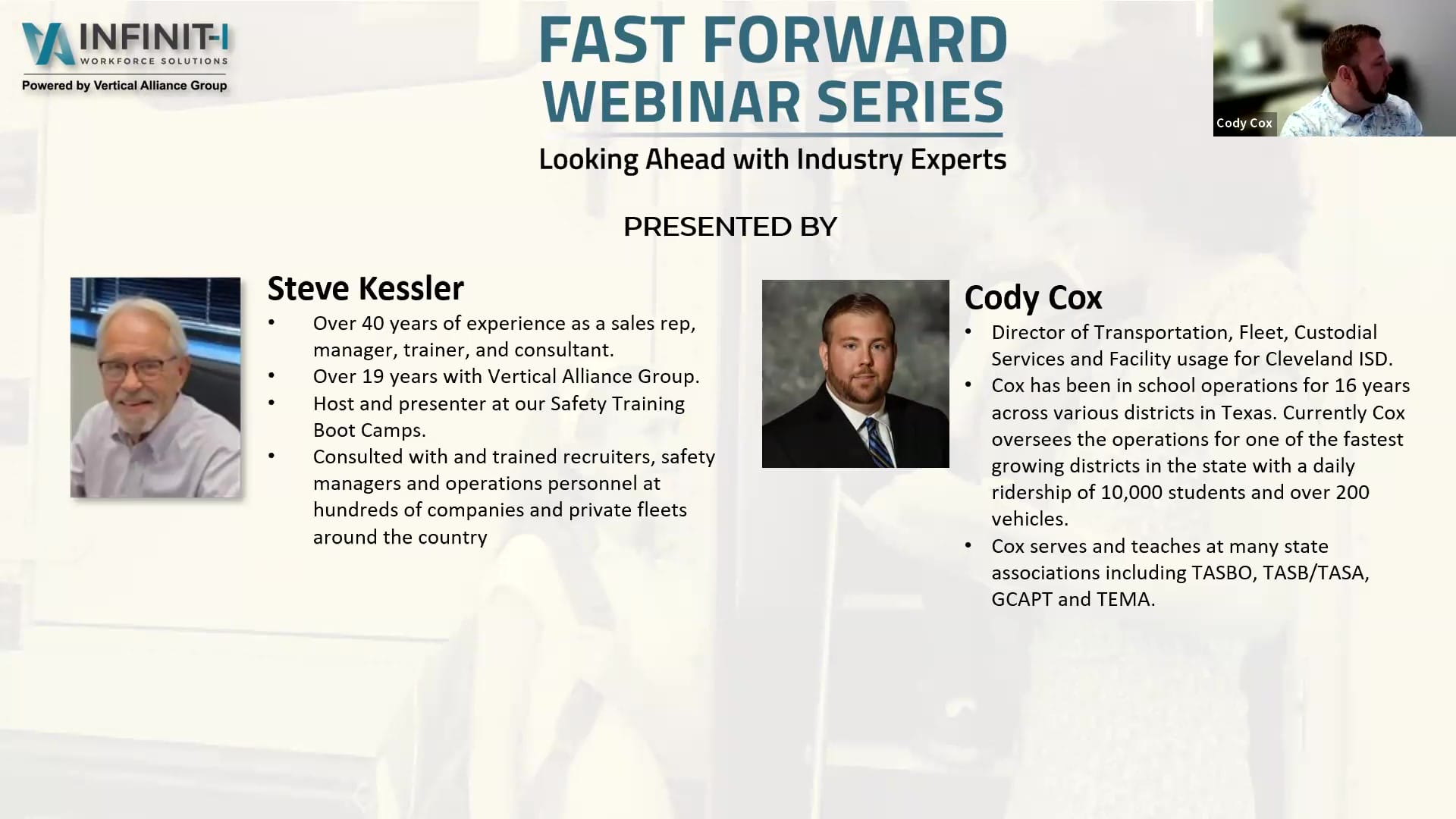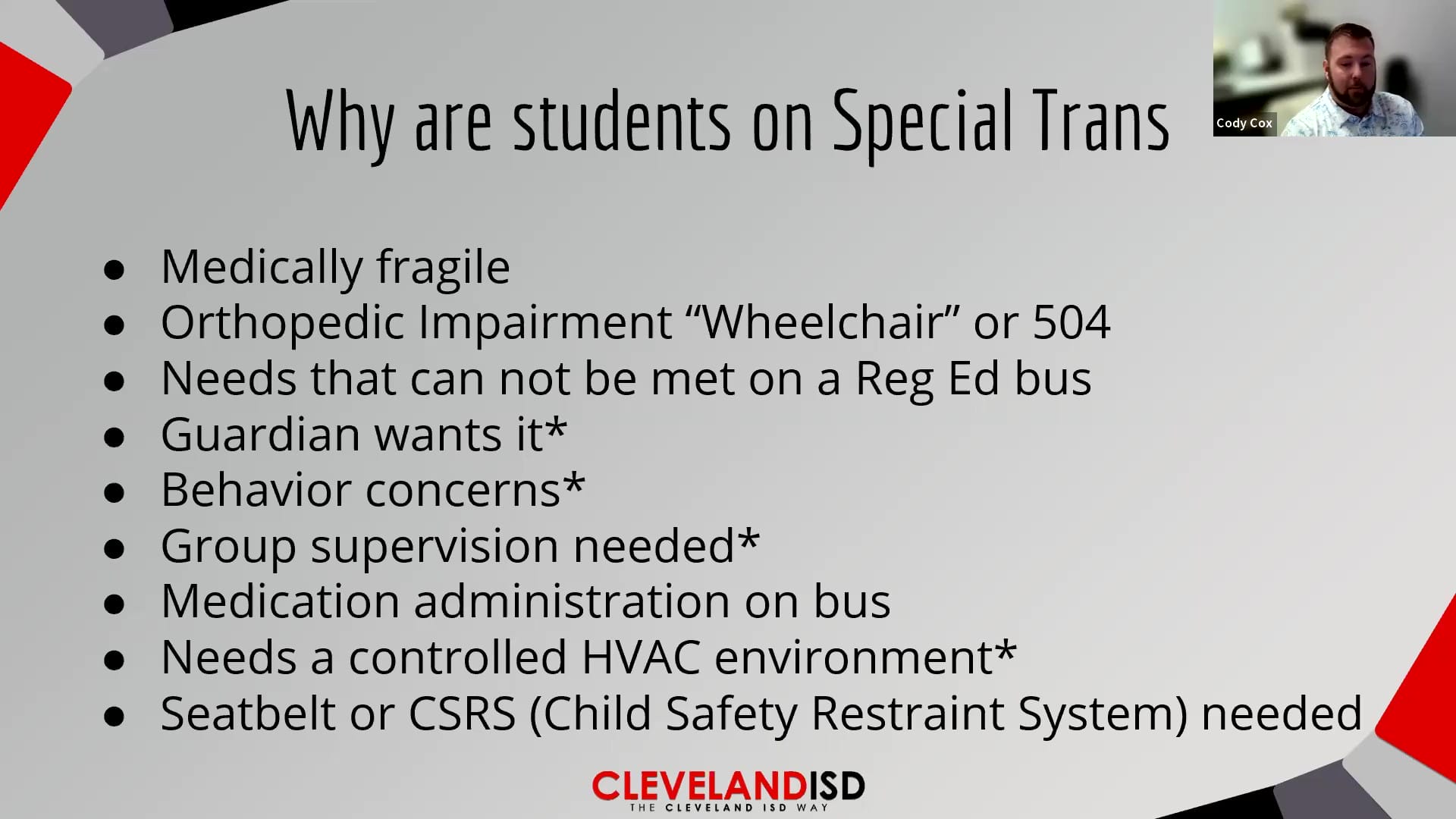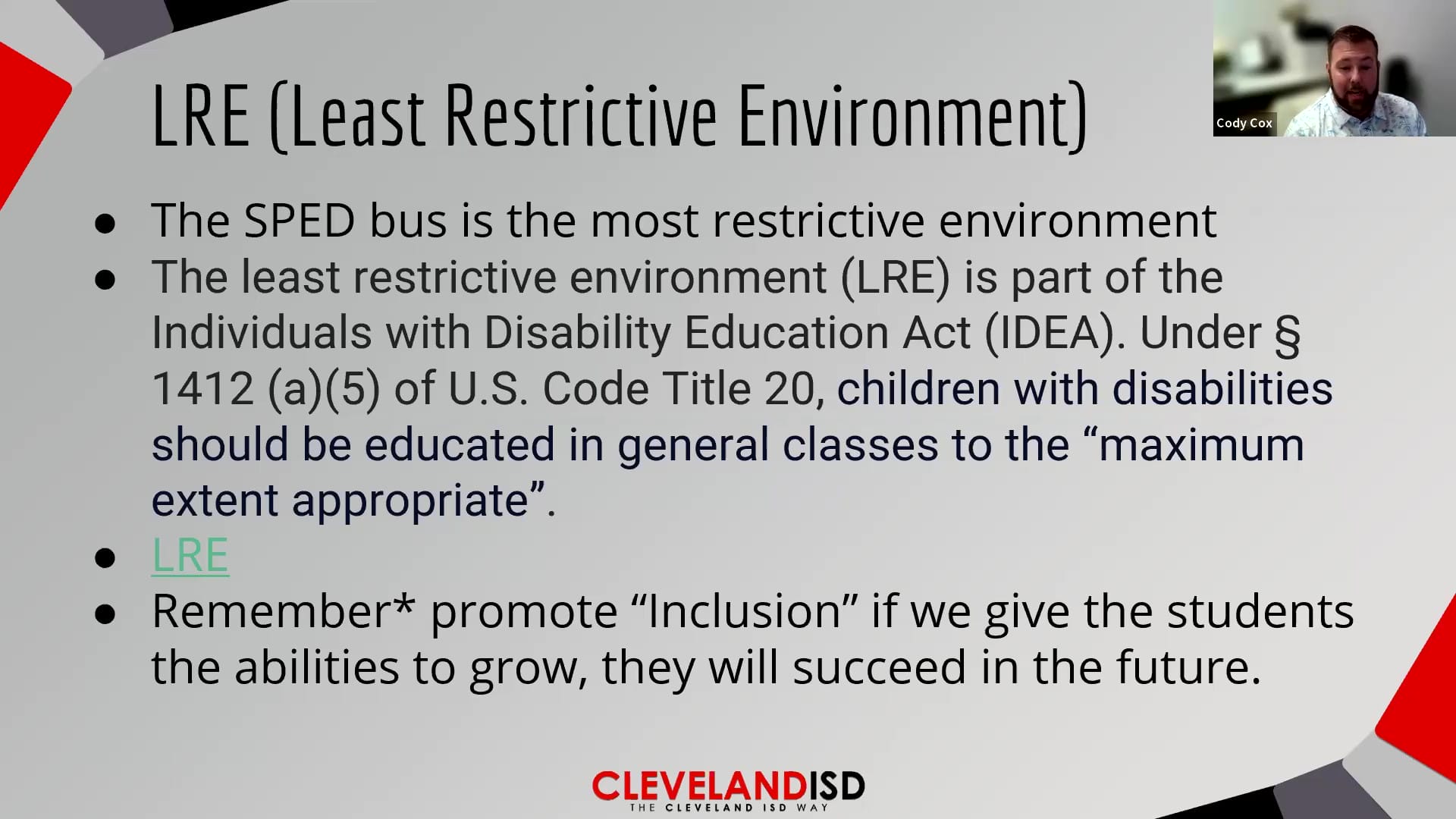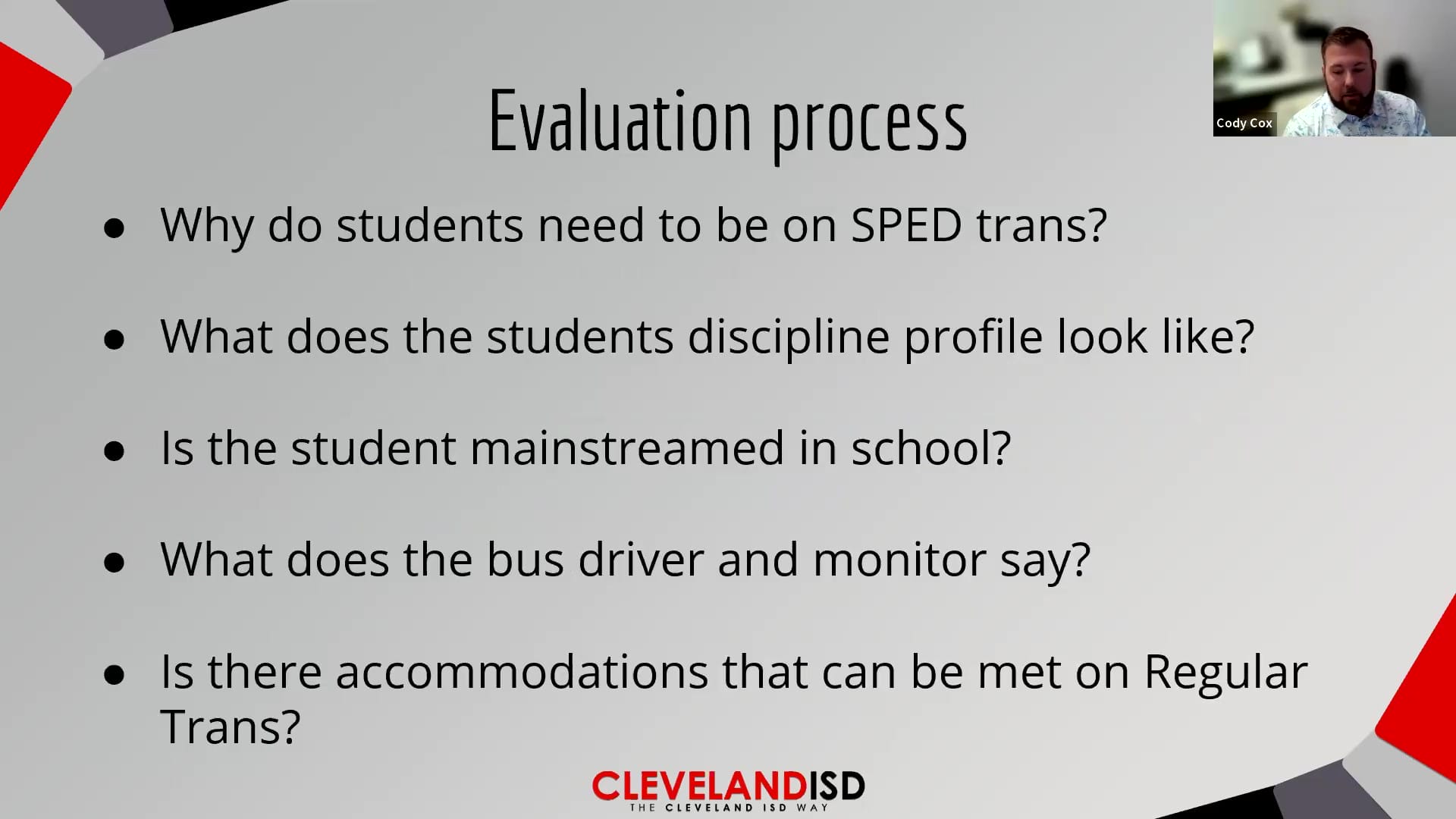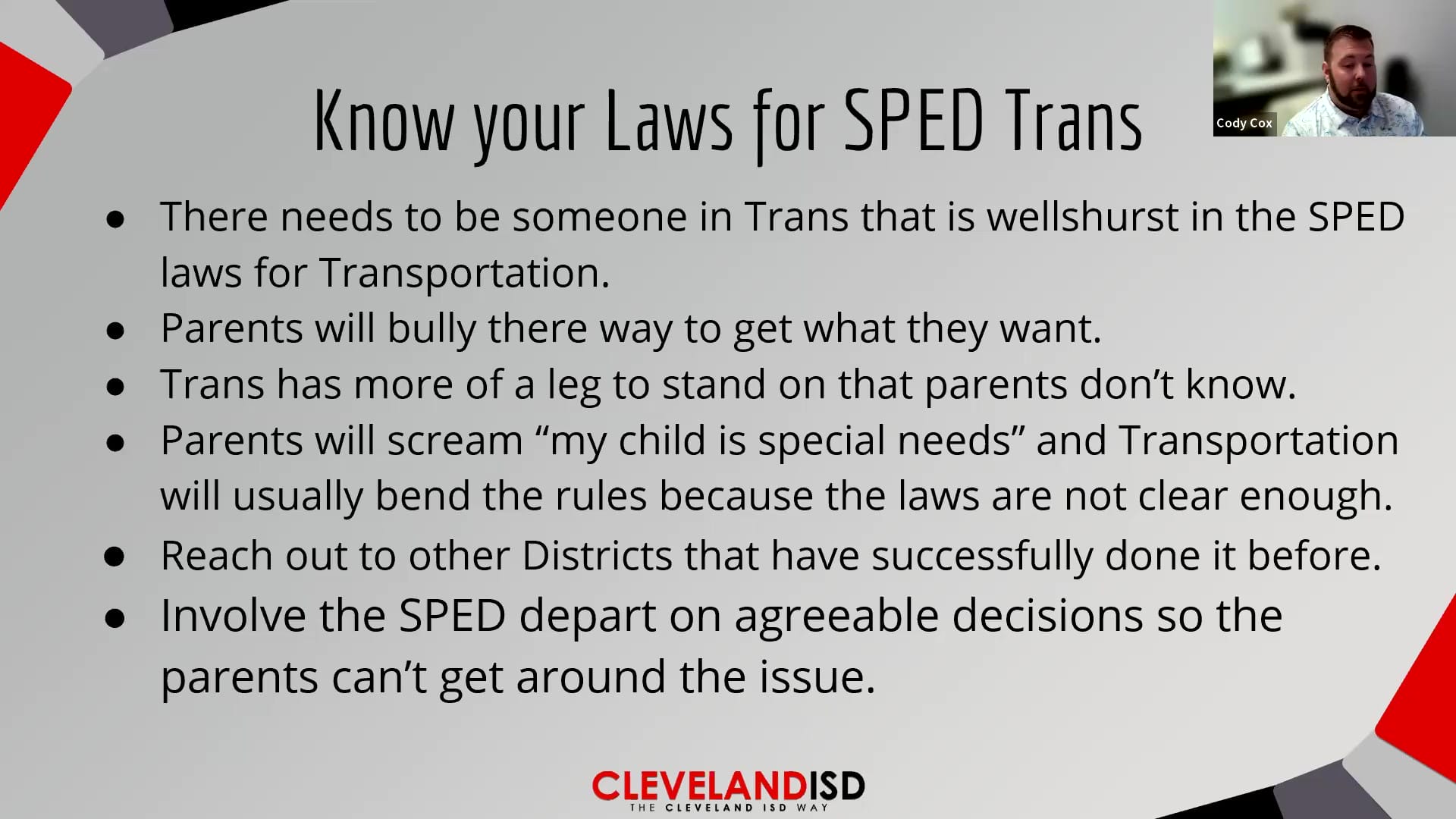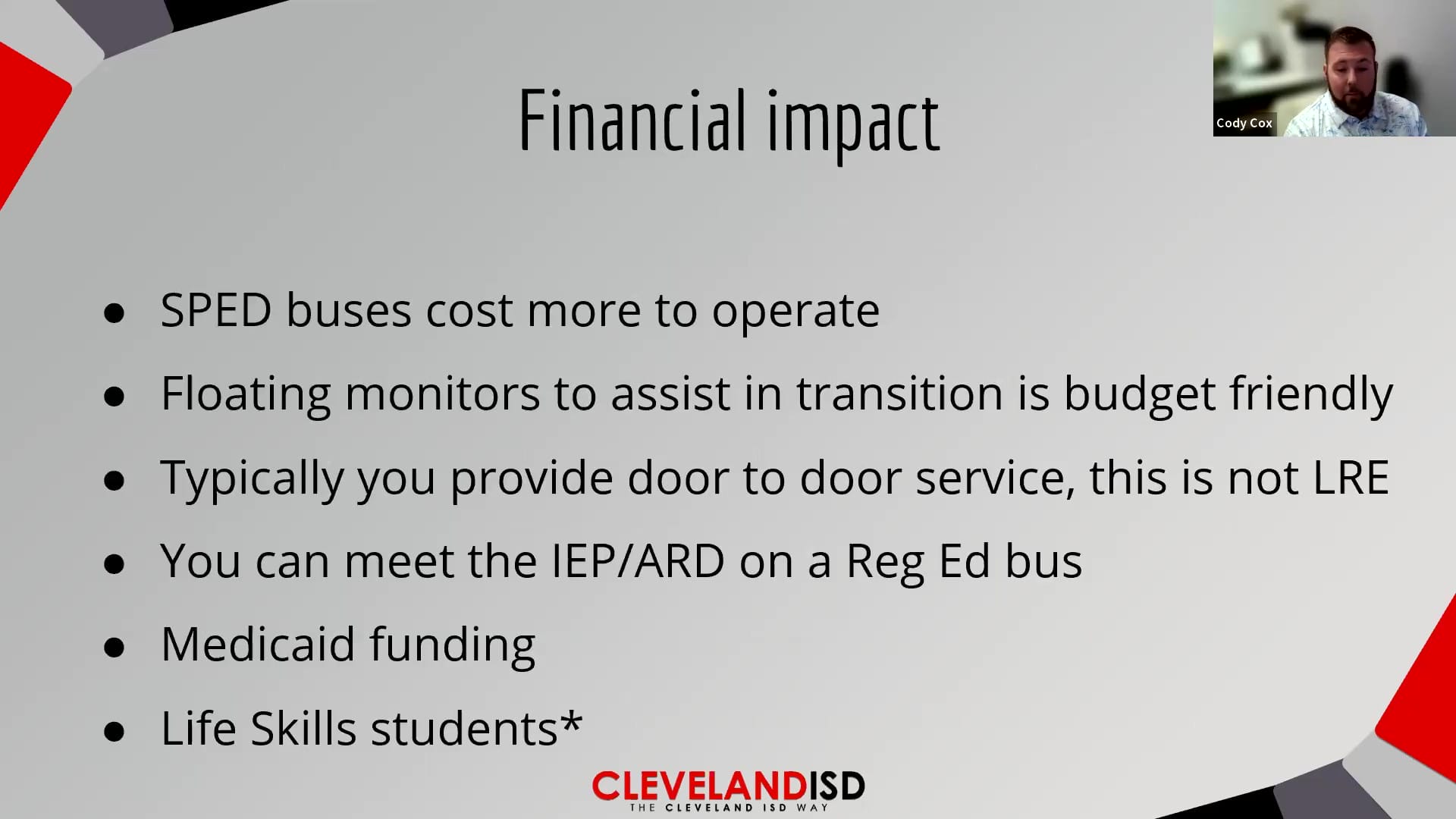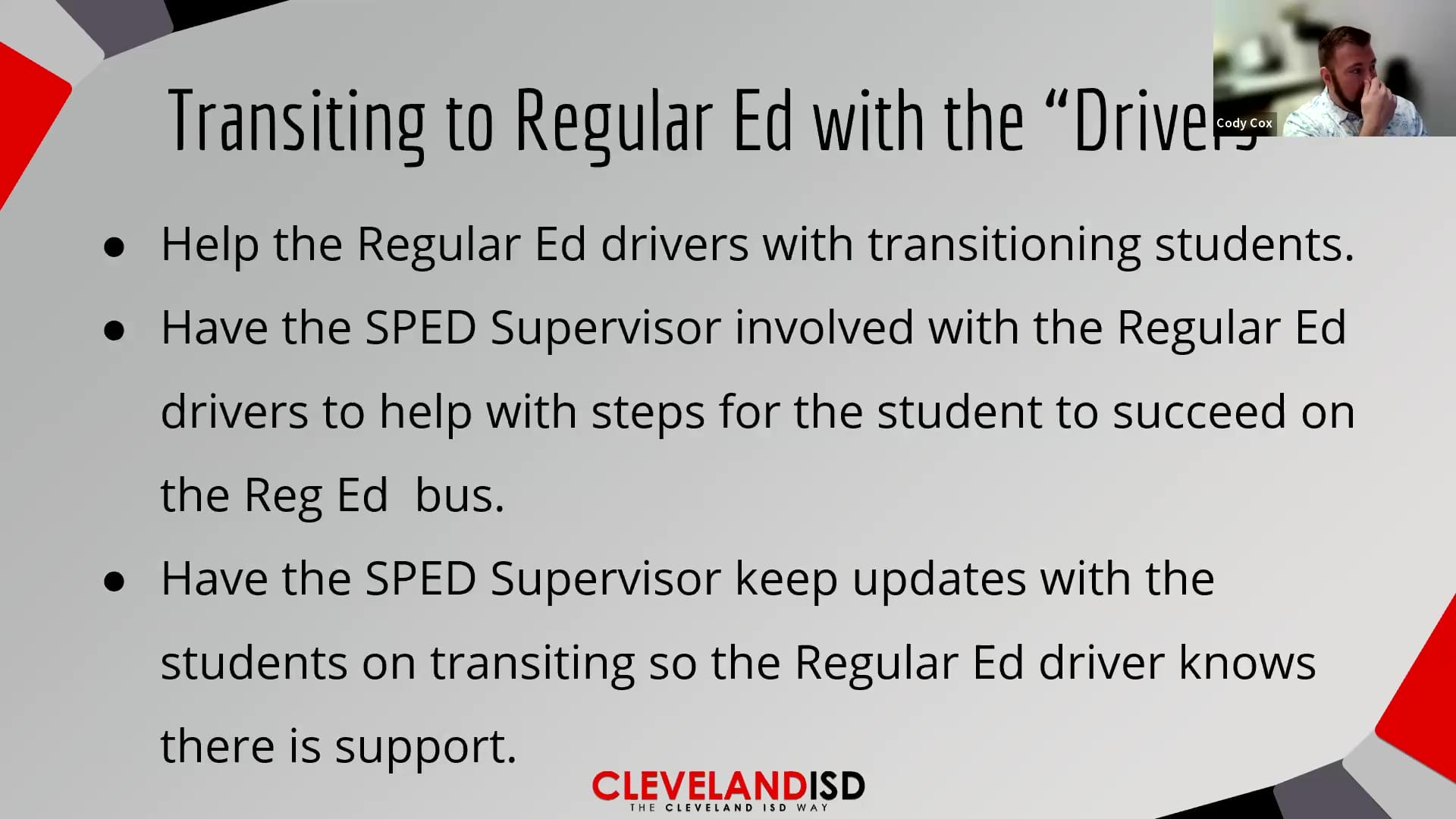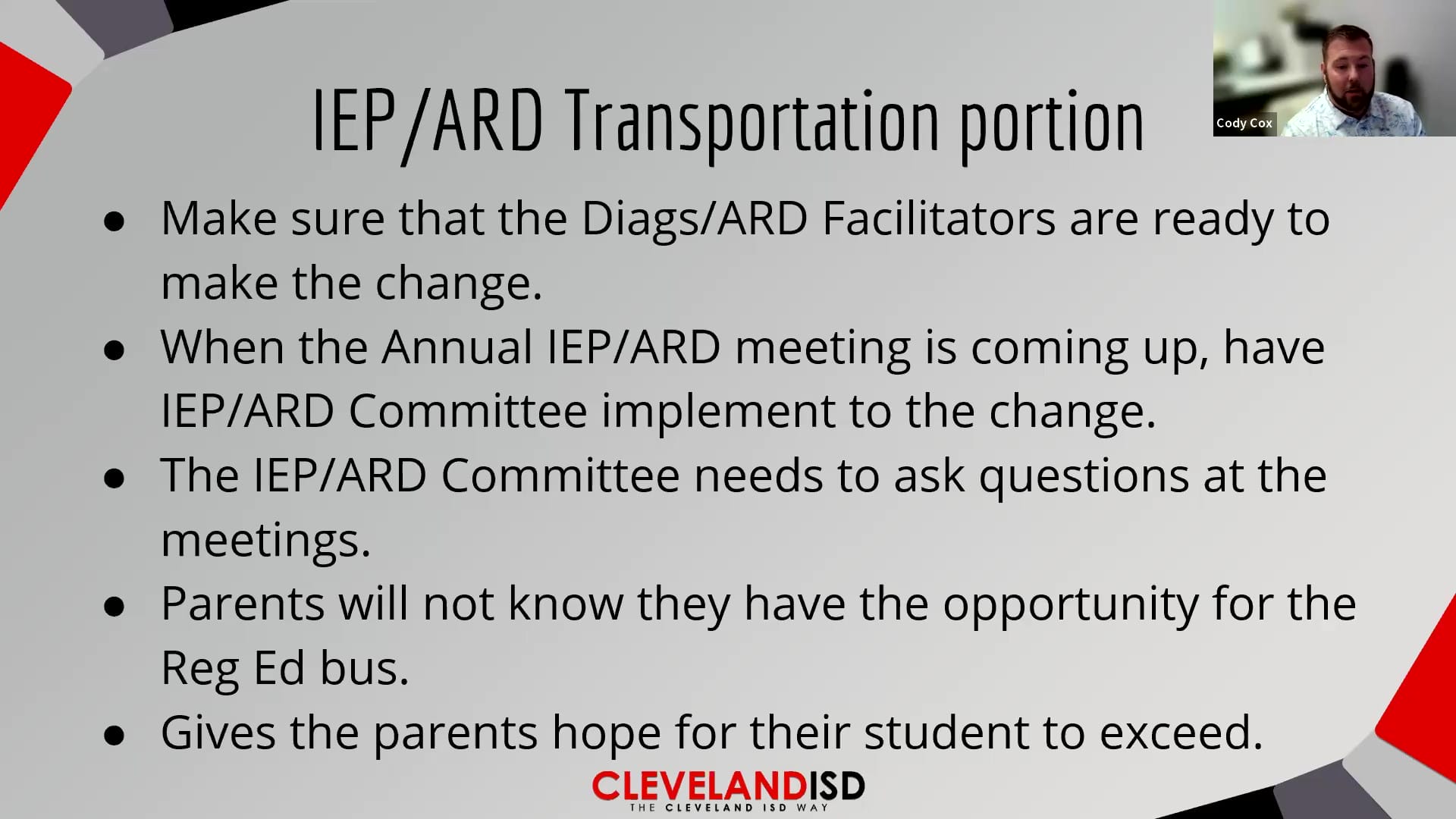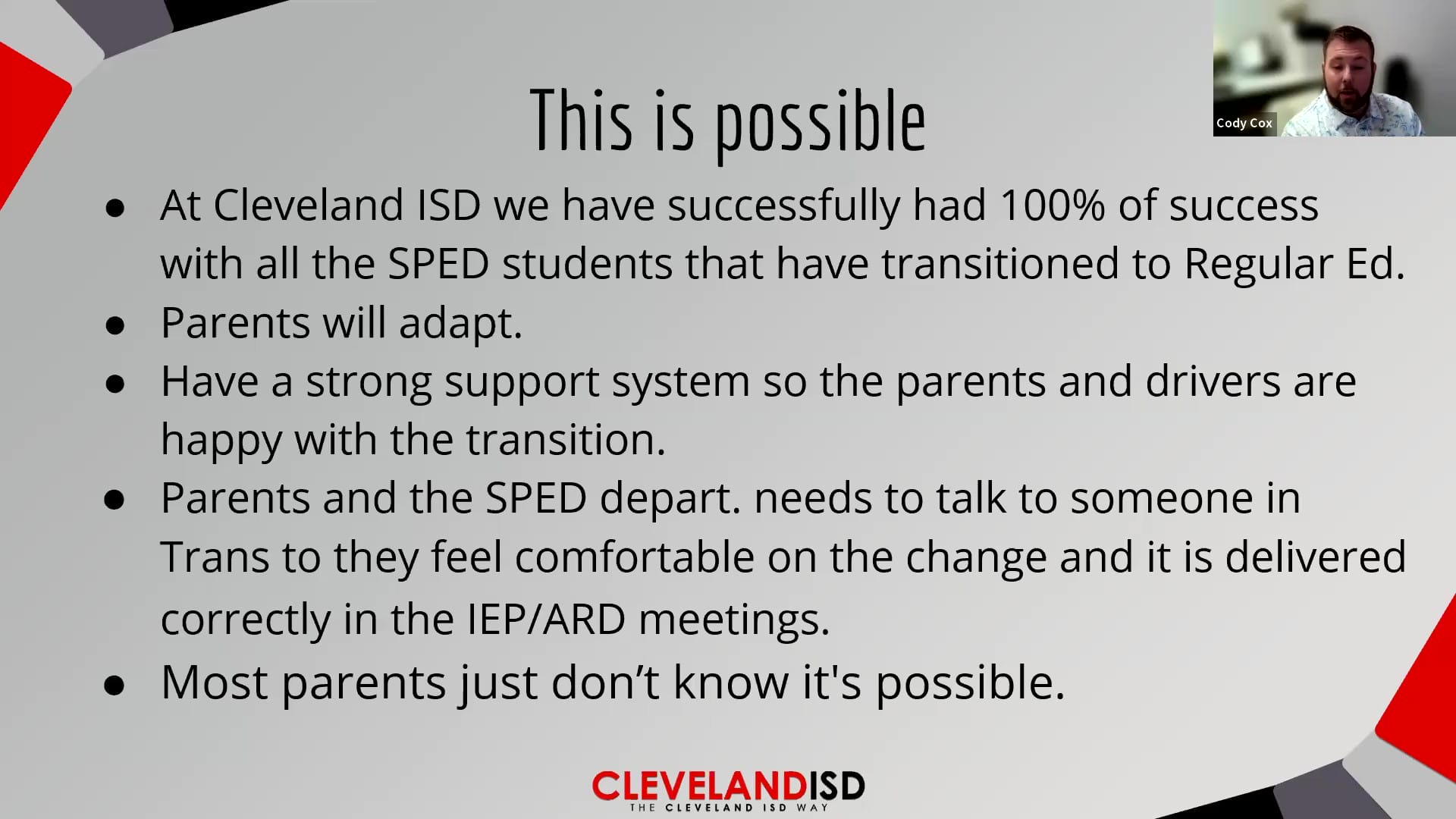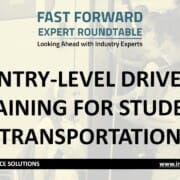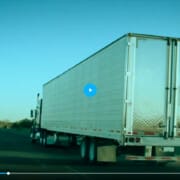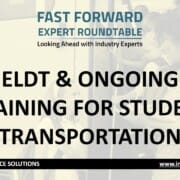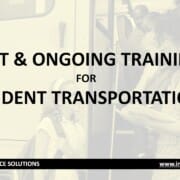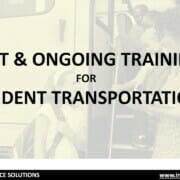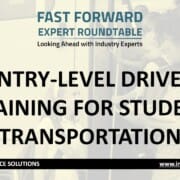Webinar Replay #61: Transporting Students with Disabilities
Transcription
1
00:00:03.410 –> 00:00:05.480
Steve Kessler: Good morning, everyone.
2
00:00:05.850 –> 00:00:10.340
I appreciate you joining us this morning. Welcome to the Fast Forward Webinar Series,
3
00:00:10.440 –> 00:00:19.139
Steve Kessler: sponsored by the Infinit-I Workforce Solutions my name is Steve Kessler, and I’m gonna host the program today.
4
00:00:19.280 –> 00:00:29.299
Steve Kessler: We certainly appreciate all of you joining us. I know it’s difficult to get away for an hour. But we do thank you all for joining us this morning.
5
00:00:29.370 –> 00:00:45.069
Steve Kessler: We’ve got a really, I believe, an interesting program this morning. It’s one that we’ve had quite a lot of requests for. So, we’re going to speak today about, you know, transitioning students, you know, from regular ed buses.
6
00:00:45.180 –> 00:00:57.969
Steve Kessler: And I think it’s a process that has created a lot of questions. So, we brought in our expert today to talk with us a little bit about that? By the way, while you’re all there?
7
00:00:58.060 –> 00:01:18.089
Steve Kessler: Why don’t you jump on the chat and let us know who you are and where you’re from so we can kind of know who’s out there, and also wanted to let you know that if you have a question during the presentation to either type it in the chat box, or go ahead and put it into the into the Q&A. Box that you have available there.
8
00:01:18.260 –> 00:01:24.760
Steve Kessler: So while y’all are doing that, let me introduce our guest today. Our guest today is Mr. Cody Cox
9
00:01:25.030 –> 00:01:34.579
Steve Kessler: Cody is director of transportation fleet custodial services and facility usage for Cleveland, ISD in Cleveland, Texas.
10
00:01:35.210 –> 00:01:43.139
Steve Kessler: Cody’s been in school operations for 16 years across various districts in Texas.
11
00:01:43.410 –> 00:01:58.080
Steve Kessler: Currently Cody oversees the operations for one of the fastest growing districts in the State, and they have a daily ridership of 10,000 students, and over 200 vehicles.
12
00:01:58.240 –> 00:02:01.970
Steve Kessler: Cody’s very active serves and teaches
13
00:02:01.980 –> 00:02:17.299
Steve Kessler: at many State associations in Texas. And I’m gonna describe these because we have a lot of folks not from Texas. So, Cody is a member of the Texas Association of School Business Officials.
14
00:02:17.330 –> 00:02:29.689
Steve Kessler: part of the Texas Association of School Boards. The Texas Association of School Administrators. He’s part of the Gulf Coast Association of Pupil Transportation.
15
00:02:29.730 –> 00:02:35.899
Steve Kessler: and I believe TEMA is the Texas Energy Managers Association. If I’m not mistaken.
16
00:02:36.160 –> 00:02:43.250
Steve Kessler: So, with all that, said, please welcome, Mr. Cody. Cody, I’m going to turn it over to you, sir.
17
00:02:44.370 –> 00:02:50.290
Cody Cox: Okay, good morning, everybody. I’m reading through the chat. So, it’s like we got a lot of people from Texas on here.
18
00:02:50.670 –> 00:03:15.080
Cody Cox: So we’ll go ahead and get right into it. Well, if you have questions, I’m sure you will. Go ahead and feel free to put them in the chat. We’ll come back to those at the end that way that we don’t have to speak about things multiple times to respect everybody’s time. So today, as you know, I said, we’re gonna speak about moving students, and making them successful with the least restrictive environment.
19
00:03:15.480 –> 00:03:32.909
Cody Cox: Again, that is law. And so a lot of times. We have a tendency to, you know. Just do what we’ve always done. And a lot of this has come up in recent years, especially in my school district, because we know everybody’s having a financial crisis. Right? Everybody’s budgets are being cut; you know. It’s like 2008 all over again.
20
00:03:33.040 –> 00:03:56.179
Cody Cox: And so, when we’re looking at different things with special needs, transportation is the most restrictive environment you can possibly give a student when it comes to transportation, and it’s also the most expensive way to provide transportation, especially if you’re outsourcing transportation. So, if you’re outsourcing transportation for your students, that are on IEPs or arts, then that’s even more expensive. So, we’ll go ahead and
21
00:03:56.390 –> 00:04:01.369
Cody Cox: move forward with the presentation. Give me just a second. It’s
22
00:04:03.760 –> 00:04:06.029
Cody Cox: Let’s see here, cause I can’t go.
23
00:04:07.600 –> 00:04:09.139
Cody Cox: There it goes. Okay.
24
00:04:09.280 –> 00:04:13.399
Cody Cox: So Steve already introduced me. So, we’ll go ahead and skip that slide.
25
00:04:16.910 –> 00:04:17.589
Cody Cox: No.
26
00:04:19.370 –> 00:04:22.819
Cody Cox: there it goes. We’ll go. Okay, so
27
00:04:23.530 –> 00:04:45.979
Cody Cox: why are students on special trans, typically, so we have a list here. And I apologize. If I’m not looking directly into the camera, I have to see both screens. So, we have medically fragile students. Right? So that’s one reason that we put students on special trans bus, orthopedic impairments, wheelchairs, 504. So, 504 is a temporary disability, right and so that’s not something that we’re gonna keep a student on there for long term.
28
00:04:46.070 –> 00:05:10.999
Cody Cox: Needs that cannot be met on the regular ed bus. So, it could be behavior needs. It could be things like as we speak further down where you have a child for safety, restraint, systems, things like that now. Yes, you could provide that on the large bus. So, depending on your operation in my district. There’s no way we run multiple tiers. All of our drivers do 3 routes or 4 routes back-to-back. We don’t have time to be pulling a car seat off a seat. So regular student can sit in that chat in that seat.
29
00:05:11.010 –> 00:05:21.040
We don’t have time for that and so some districts. You might have that. If you’re a smaller district and you still operate one tier, then you can do that right, because that’s the only child that sits in that seat.
30
00:05:21.220 –> 00:05:36.110
Cody Cox: Another thing is guardian wants, so you’ll see a little asterisk next to a few of these the asterisk is that a lot of times. This is where we get caught up in and in our district, we get caught up in this a lot. Well, the mom wants it, or dad wants it, or guardian wants it. Well, why do they really want it?
31
00:05:36.290 –> 00:05:44.789
And so I believe in using examples of stories to teach? And so, I’ll tell you. Here recently we had a situation where
32
00:05:44.940 –> 00:06:03.159
Cody Cox: mom did not want her child on the special needs’ bus, but that’s what they thought she wanted. And so, when we had the ARD meeting and again into my district, we’re fairly large district, you know. We don’t have a translation representative at every ARD. It’s just our IEP sorry for those of you that are not from Texas, IEP and ARD are the same thing.
33
00:06:03.270 –> 00:06:27.160
We don’t have we don’t have enough staff to do that and so that’s came down to us. And it came down to my supervisor to oversees special trans. Is that you know. Well, when we contacted Mom, mom was like, well, I don’t want her on the special trans bus matter of fact, her sister is younger, and she needs to be on the big bus to help her sister get on and off the bus. So that raised a red flag for us. And we were like, okay, let’s do a little digging.
34
00:06:27.250 –> 00:06:32.190
Well, there was a simple fact that Mom was talking about wanting a seatbelt.
35
00:06:32.230 –> 00:06:39.679
Cody Cox: Okay, so mom was time. I want a seat belt in the ARD and the IEP meeting, and the guy just put down. Okay, special trans.
36
00:06:39.930 –> 00:07:03.030
Cody Cox: and so that’s where it goes into training. Your training your staff. So, we have a meeting every year with our in our district. We have what we call APS’s assistant principals of operation. It’s a position that we created, and then, so that as a go to person for everybody in operation, so, my people in transportation, my custodial supervisors, my child nutrition supervisors. They all have one person at the campus to go to
37
00:07:03.110 –> 00:07:28.070
and so that was really good about that is, that’s the person that sits in there. So, we’re able to have trainings with them. That, hey, guys, you know, our buses all have safety belts on them. Okay? So, in Texas that lock came to effect in 2017, and we’re very fortunate in our district that we only have a few buses that we own that no longer have seat belts. Okay, most of our route buses are all 2017 or newer. Not everybody has that right. But that’s where we want to work with our special needs
38
00:07:28.070 –> 00:07:53.020
department and say, well, if we need a seatbelt, okay, great, we. So, before we got to that point, we would move our fleet around, right? And so, if that child and that bus needs a seat belt and other buses don’t have it. Well, am I going to put that child on a special trans bus which is the most restrictive environment? Or am I just gonna move my fleet around and make sure that we can put a bus on that route that has a seatbelt. So, you solve a lot of issues there. You didn’t create an additional cost for the district by just moving buses around.
39
00:07:53.020 –> 00:08:22.740
So we come across that a lot where the guard what the Guardian wants is what we always do. And so, we’ve had to teach our facilitators and our APO principals that it it’s not about that they need to actually be diagnosed. They need to actually be verified that they need to be on that bus. And so, in our district, our special transportation director. She has made a list, and so we do have a lady. We have several layers in our district, and we have a lady that’s the director of SPED, and she helps with that function of it.
40
00:08:22.740 –> 00:08:39.990
She has made a list that you have to triage the students. So, if Mom wants them to be or guardian wants them to be on special trans. Do they check all these boxes? Right? So, it’s about evaluating the situation with the child. Do they really need to be on that special trans bus? Or are we just putting them on there? Because we feel like that?
41
00:08:40.210 –> 00:08:52.829
Cody Cox: That’s what they need. Behavior concerns. That’s always a big, hot topic for me is behavior concerns. I don’t know how many times in my career I have went and looked at a child’s behavior on the bus, and we haven’t had any issues.
42
00:08:52.830 –> 00:09:14.070
So Cody does great on the bus. We don’t have any issues with Cody on the bus, but he has a horrible behavior record in the school. Well, it’s because the school is making him do something he don’t wanna do right. And so that happens a lot. And so just kind of tips and tricks is, make sure you’re checking that. So, we have a rule that we will. Never ARD a child a special transfer behavior unless we have data to support that.
43
00:09:14.070 –> 00:09:37.899
So if they’ve come up from in our district, as you know, you have to. By law, we have to uphold their EIP, their ARD from the previous district. But that doesn’t mean we can’t quickly set up a meeting and have them reevaluate it. And so, we will talk to the bus driver. If we’re moving them from regular into special trans, let’s talk to the current bus driver. You know, how’s the how’s the student been? We’re gonna pull up their profile? Have they had a bunch of bus referrals? If they haven’t had a bunch of bus referrals.
44
00:09:37.900 –> 00:09:58.190
then then we’re not putting them on special trans because of behavior. That’s a campus-based concern. But it’s not a bus-based concern. And so, it’s again giving the people access. And so, our APSs have access to all the bus referrals again. That’s why we made that position. That position has access to the things they need to know, so they can do their own research and triage.
45
00:09:59.040 –> 00:10:22.320
Group supervision. Right? So, I in every district I’ve been in, I will. I always put my foot down. We’re not gonna do individual supervision. So that’s one of the boxes you’re checking when you’re doing. IAPs right? And you’re justifying why, they need to be on a special trans bus a lot of times. Only thing that you’re checking is group supervision. If you guys really look at their transportation supplements, almost every district I’ve been in, and I’ve been in 8 districts.
46
00:10:22.360 –> 00:10:45.839
It’s always well, they have group supervision. Marked group supervision means there has to be a second adult present. Right? It’s not just the bus driver. Well, we can accommodate group supervision on the big bus. You can. It can be done right. It’s just another adult and so it’s not always ideal, right? And so, in my district we do have monitors on big buses, not every big bus, by any means, guys, but we have them. And when we need to move someone. So, for example.
47
00:10:45.840 –> 00:11:07.879
we will go to art, and we’ll say, well, this child’s been doing really well, because we’ve got our staff trained where they’re gonna reach out to a transportation special needs supervisor. And say, how has how is Cody been doing? How he’s even doing his arts coming up. Can you give me a brief on how he’s been doing? Obviously, we have our students that we know are going to be on special transfer, whole entire career with us. Right? But we have those ones that can progress out of it.
48
00:11:08.090 –> 00:11:32.959
Cody Cox: The ones that can progress out of it. We get our special needs supervisors she goes through, and she looks at their history and she says, Well, they’re doing pretty good. Okay? So, then what we do is we say, okay, well, we’re gonna merge them. So, we’re actually not gonna change their accommodations. We’re gonna have the big bus. Come, get them instead of the special needs’ bus. And we’re not changing anything on their IEP guys because we’re gonna put a monitor on that bus. We have a handful of monitors that we kind of rotate around.
49
00:11:32.960 –> 00:11:55.920
We’re going to say, okay, bus one now needs a monitor. And we’re going to help that child. Right? So it’s kind of like being a life skill student. Even though these students are not all life skills. we’re gonna help them get to that point where they can be independent. And so, we’re gonna do a 6 month trial period with that monitor on the bus. The Monitor is gonna give us feedback. The drivers gonna get feedback, and then we’re gonna go back to our committee when we go back to our committee. Sorry IEP.
50
00:11:56.030 –> 00:12:02.309
Cody Cox: We go back to IEJP. Then that’s when we’re gonna have a conversation. Okay, they’ve been successful on the big bus, right?
51
00:12:02.350 –> 00:12:18.989
Cody Cox: There’s no there’s no law that says they have to be on a special trans bus. There’s no such thing as a special trans bus. A bus is a bus is a bus. We call it a special trans bus because it’s a wheelchair adaptive bus, right? Many school district runs special trans buses that don’t even have a wheelchair lift.
52
00:12:18.990 –> 00:12:33.939
Cody Cox: Okay? And so again, we could still meet their accommodations on the big bus, and we can get them off that off of that special trans bus. And really, that’s the right thing to do for the child. Right? We’re preparing them for life. We’re preparing them to ride the metro. We’re preparing them to be independent.
53
00:12:33.940 –> 00:12:36.470
And so that’s another thing that we always work on.
54
00:12:36.570 –> 00:13:00.710
Cody Cox: Another reason that students are on special trans buses is, if we have to administer medication. In my district, we will not administer medication on a large bus unless the student is able to do it by themselves. So on a regular mainstream bus we will not administer medication. We only administer medication on the special Trans bus unless it’s medication. The child can do our own EpiPens. Things like that. Obviously, we’re gonna allow that to be on the large bus, but anything rectally.
55
00:13:00.710 –> 00:13:11.729
And there’s some districts that don’t do those at all. We do. We have a very vast group of students that have vast needs. If we didn’t. If we just said, we weren’t gonna administer any medications on any bus.
56
00:13:11.730 –> 00:13:23.929
Cody Cox: We’d have a lot of issues there. And so, we do have plenty of students that need to have those medications administered rectally or orally, when they’re not able to cognitively do it themselves.
57
00:13:24.490 –> 00:13:47.839
Cody Cox: And then, HVAC, this is another one always gets me so other States may not have this, but in Texas. Most of us have air conditioning all our buses. And so, when I did audit this summer, I sat down with our special Ed director that focuses mostly on the on the transition and transportation piece of our district. And you know, and I was like Shannon. Why are we checking the box of HVAC, needing on all these buses?
58
00:13:47.840 –> 00:14:06.309
We don’t own a bus in this district that doesn’t have air conditioning. Even our spare buses have air conditioning. We literally do not own one that does not have air conditioning. So that’s no longer a thing. We shouldn’t be putting children on special needs bus because they need air conditioning. Okay? And so that’s just something to look at, just tips and tricks.
59
00:14:07.850 –> 00:14:20.929
Cody Cox: See? And then we already talked about such out safety restraint systems. Okay. So again, like, I said, if you could meet the needs, I’ve been in really small districts. I’ve been in really big districts. Cleveland’s a medium sized district. In my opinion, some people would call it large.
60
00:14:21.170 –> 00:14:37.959
Cody Cox: I’ve been in districts with, you know, 700 to 800 buses, and so you know, with us, having close to 200 to me. That’s medium. But we just don’t have the flexibility. I’ve been in districts where I had 30, 40 buses, and we had the flexibility, we could put a safety seat on a regular bus. No problem.
61
00:14:39.220 –> 00:14:41.650
Cody Cox: Okay.
62
00:14:43.160 –> 00:15:04.519
Cody Cox: sorry guys, this computer. So least restrictive environment. I’m sure you guys know that law? So, it’s part of IDEA. The SPED bus is the most restrictive environment. If I don’t know if you guys can click on that or not. I had hyperlinked idea the law into the LRE. So later on. If you want the presentation, you’re more than welcome to email me, and I’ll send it to you.
63
00:15:04.520 –> 00:15:19.410
And remember, we’re promoting inclusion. If we if we give students the ability to grow, they will succeed in the future. Right? So that’s kind of the background of IDEA is that we need to make sure we’re including the students. You know, we’ve moved off from the days where we segregate everybody out
64
00:15:19.430 –> 00:15:44.420
and so we need to promote inclusion. We need to promote least restrictive environment. And we just need to make sure that we’re always thinking about what’s best for the student. I can tell you. There’s been many a times that I’ve sat in meetings, and we’re just gonna be professional and consistent. And we’re gonna be backed up with data. And it’s not always what the guardian wants. You know the Guardian sometimes. You know you heard of muncher syndrome? Sometimes we and we know we disable our own
65
00:15:44.420 –> 00:15:59.200
students, you know. You know, with a lot of times as parents, you know, I’m a parent of 3. I have 3 kids, you know, and of course you want a baby, your own child. You want it, you think you’re helping and protecting them. And that’s where, as a district, sometimes, we need to help those parents see? Well, you’re actually not helping them.
66
00:15:59.200 –> 00:15:59.960
Cody Cox: Right?
67
00:16:00.940 –> 00:16:09.309
Cody Cox: Okay? So, the evaluation process, that kind of got off track. And we talked about that a little bit. But why do students really need to be on special trans.
68
00:16:09.360 –> 00:16:22.599
Cody Cox: you know there’s a lot of time. So, I can take in our district. We have taken 406 students to date this year and to move and transition them to the big bus. 406 bus riders have gone from special trans
69
00:16:22.600 –> 00:16:46.539
Cody Cox: to regular and it’s 2 reasons. Guys one, it’s the right thing to do for the kids. You know, don’t get me wrong. They’re gonna be some kids like anything we do. There’s gonna be some kids that might find their way back on a special trans bus because it just didn’t work out right. But 406 kids like, I’m actually proud of that. And so, it was interesting. When Steve reached out and said, hey, do you want to talk about it? Because we’ve kind of been one of the forefront people on this
70
00:16:46.640 –> 00:17:06.260
Cody Cox: and you know I’m very proud of our team and what we’ve done to help these students. And then the other thing is, we’ve seen a significant cost reduction. And so, we’re the one of the fastest growing districts in the State where we I just looked yesterday at our board meeting. We’ve surpassed the 2,000 mark we’ve added over 2,000 students this year, and we’re bringing the number down.
71
00:17:06.270 –> 00:17:25.859
So we’ve added over 2000 students, and we’ve cut 2 entire SPED runs. And in my district when you cut 2 runs that, you know. That’s 2 buses. That’s 3 and 4 runs something that’s not just one route. All of my buses serve 3 and 4 schools morning and afternoon, and then we also run late buses. Most of our routes run till 7 30 in the afternoon.
72
00:17:26.109 –> 00:17:29.169
Cody Cox: And so just things to think about.
73
00:17:29.180 –> 00:17:58.209
Cody Cox: And then we talked about that already, students’ profile for discipline. That’s big guys. So again, the way they act in school, I could tell you, for a fact like when I was a bus driver. So, I did. It’s a little bit background about me. I started out as bus driver when I was 18. I didn’t have problems with my kids, but I’d always get told by a teacher. Oh, you know. So and so it’s having a real bad day to day. I’m like, okay, well, bring it on. And he gets on. The bus sits down. We cool, right? It’s cause. It’s a different environment guys. And so, it’s always important to look at that.
74
00:17:58.880 –> 00:18:10.209
And then is the student mainstream in school. That’s another thing we look at. So, when I first came to this district, we were having all these complaints, especially from our secondary schools. Our high schools are not grade campuses or middle schools.
75
00:18:10.210 –> 00:18:35.179
Cody Cox: Well, the SPED bus keeps leaving this kid, right? They keep leaving Cody. And well, you know, okay, well, how are they leaving Cody when Cody gets walked out with his peers. Well, Cody doesn’t get walked out with his peers. Cody is a mainstream student. Well, okay. So, he’s in regular classes, and most, you all know, is kind of an industry standard and practice that you know the special needs students come out few months before the bell rings they put him on the bus. Make sure they get situated. So, you know, in our
76
00:18:35.180 –> 00:18:45.709
district we have large schools. If we, if we let the special ed- kiddos come out the same time as regular ed-kiddos man. We’d have mass chaos, because, you know, we load like 3,000 kids in our high school all at one time
77
00:18:45.810 –> 00:19:07.839
Cody Cox: in a 7 min window. And so, we figure out, okay, well, why is Cody not coming out with his peers, you know. Well, it’s because Cody’s mainstream. Cody’s coming out with the big bus riders. So, then you have to ask yourself, okay, well, why is he on a special trans bus? Oh, well, it’s because he’s always has been, and he used to be, have special Ed services. And so again, just tips and tricks
78
00:19:07.980 –> 00:19:21.530
Cody Cox: I would audit. I would highly encourage you to audit your special trans riders. I don’t know how many kids, and I don’t have the number, but it was several that have been dismissed. Y’all dismissed from special Ed services within the district.
79
00:19:21.530 –> 00:19:46.519
Cody Cox: but nobody ever updated their information, you say. Well, how did you continue to get a supplement every year in my district. We require a supplement. If you want something changed in the beginning of the school year, they better have updated supplement. We’re not routing a child from last year’s supplement. That’s not happening. And if you really want to get down to the knitting, greedy we’re not talking about that today, but really, you’re breaking the law because you’re gonna request for Medicaid reimbursement.
80
00:19:46.520 –> 00:19:56.959
And if you’re not, you should be for those kids. And if you don’t have accurate supplement, then you’re falsifying a document. Okay, saying you’re meeting their supplement requirements on your Medicaid reimbursement.
81
00:19:57.060 –> 00:20:08.829
Cody Cox: That’s a whole new thing for another day. And so again, like I said. So we continue to get those. Well, if you all use ESPED these different programs. Well, here’s a click of a button, and they’ll roll all the kids.
82
00:20:08.830 –> 00:20:32.829
Cody Cox: So, they’ll have all their meetings in May. They’ll have all their update art meetings in May, you know, April, May, and then they’ll roll all the kids, and they’ll just say, okay, roll to the next school year. And then all sudden, these supplements coming out because again, they update them in April and May with the actual committees. And so, we found several students that we were like. They don’t even receive special services at all. And so that’s just another thing to look for.
83
00:20:33.550 –> 00:20:59.409
Cody Cox: And then we talked about that. What are your drivers and monitor say, you know, that’s always really important, you know, it’s and I know you all know this. But it’s very important on what you know what’s really going on the bus they’re on, you know. We’re very fortunate in our district. We’ve had a very supportive Superintendent School Board, and we got where we can just pull cameras at the fly on our computer and watch them. And so, we don’t really have to interact with the driver that much. We just pull camera watch and see how the kids doing right?
84
00:20:59.490 –> 00:21:29.379
Cody Cox: And so that’s a great thing about technology nowadays. But make sure you’re looking into that. Make sure you’re looking to see what’s really going on there. And then. Are there accommodations that can be met on the regular trans bus. A lot of times you can’t. A lot of times you can meet those accommodations. We had one the other day, and Mom was just like, well, you know, he gets really upset when he’s cornered, squished into a tight environment he kind of claustrophobic. Okay? Well, let’s look. So, we’re a fast growth district. It’s not uncommon for our buses to have 70 something students on them.
85
00:21:29.390 –> 00:21:53.760
Cody Cox: And so, let’s look and see. Well, just happened to be where that student live was kind of a far-out route, and there was only like 40 kids on that bus, so he could have his own seat. And so, when we did the research, it took the time, instead of just saying, oh, you know what you’re right. Let’s put him on the SPED trans bus. That was the easy answer. But we didn’t do that. We said, well, let’s talk about it. Let’s look into it. And so, we did the same thing. We put a monitor on that bus. We put them over there with that driver.
86
00:21:53.760 –> 00:22:04.240
Cody Cox: And he was great. We haven’t had any problems with him. And Mom even was Mom called us, and Mom was excited. I shouldn’t say us, call transportation was excited. And we moved him off.
87
00:22:04.240 –> 00:22:12.750
Cody Cox: I mean a lot of times, you know, once they see it, it’s kind of like relinquishing that that purse string. Once they see. Okay, they’re gonna be okay. You know, we can do it.
88
00:22:14.020 –> 00:22:16.280
Cody Cox: Let’s see here.
89
00:22:18.060 –> 00:22:38.240
Cody Cox: Okay, so knowing your knowing your loss for SPED transit. So there needs to be someone in the transportation department that is well versed, and, you know, have the laws of transportation. If you, if you don’t know the laws of transportation, I highly recommend you start looking at that because I don’t know all of the laws in the other States. We have a lot of people from Texas here, so I’ll just speak on Texas.
90
00:22:38.320 –> 00:23:01.459
Cody Cox: You know, in Texas we have TORT laws, Texas TORT laws, immune government entities from negligence, and lots of things, but they don’t when it’s vehicular. So, in all my Texas folks they don’t want us too vehicular. So, if they can prove that you’ve done something with that yellow school bus that has neglected something or neglected their child. We are 100% liable, so make sure. You know.
91
00:23:01.610 –> 00:23:22.760
Cody Cox: You know I, depending on what level of hierarchy you are within the within the district. If you’re at that level, make sure you’re familiar with your general counsel. You know we have a great attorney; you know. I could pick up the phone any time and call Allen and be like, Hey, Allen, I just want to run this by, you know. That’s what they’re there for. Just make sure you have that open form of communication. Because, again, like I said, we’re going to be great until it involves that yellow dog.
92
00:23:23.460 –> 00:23:29.120
Cody Cox: You know, we talked about parents, you know, we’ll pull either way into getting what they want. We talked about that
93
00:23:29.160 –> 00:23:34.439
Cody Cox: Make sure I’m not double repeating things
94
00:23:34.850 –> 00:23:35.950
Cody Cox: And then again,
95
00:23:36.720 –> 00:24:00.379
Cody Cox: we talk about Munchausen syndrome. So, muncher syndrome is self-diagnosing basically people and saying that they have a issue that they don’t have, or a disability that they don’t have. So, my child has special needs, and transportation will usually bend the rules because the laws are not clear enough, you know that’s all. Goes back and know your culture. So, I didn’t talk about this at all. Any slide. But know your culture. In my district I have been several district guys, and I
96
00:24:00.380 –> 00:24:25.359
by no means advocating. Hey, let’s go pull the rug out from our everybody for the you know, and say, well, we’re being efficient. You gotta know your culture like. Do not set yourself up for failure in my district we’re in a means of let’s stay afloat financially. So, we’ve got to do everything we can. We’ve got to unturn every page and uncover everything we can to try to help that budget. Okay? There’s some district that’s not gonna be a thing they’re gonna want to touch. They’re gonna
97
00:24:25.360 –> 00:24:27.880
want to keep it that way. So just keep that in mind.
98
00:24:28.230 –> 00:24:52.639
Cody Cox: Reach out to other districts. So again, you’re more than welcome to reach out to myself. If anybody wants to get into the nit and gritty, I’ll get you in contact with my special needs’ coordinator she’s really the nuts and bolts behind a lot of it. She’s the one that actually goes with our special Ed director, with my elevated role. I no longer really get into the weeds with that, but she goes and meets with all the diags. and the diagnostic, the APO’s and
99
00:24:52.640 –> 00:25:10.139
Cody Cox: Works with them on training. So, we do training several times throughout the year? And we have documents, too, and we can get those if you all want us to share them with you. That shows how they evaluate the student. Right? So, they have to meet all these areas. And then we can talk about special trans. And also remember
100
00:25:10.260 –> 00:25:26.019
Cody Cox: it’s a slippery slope. Guys remember that it is the committee’s decision. So, we have to groom and train our people to make solid decisions. We, as administrators cannot come behind them and overrule their decision. That’s not the way the law works with this.
101
00:25:26.020 –> 00:25:55.369
Cody Cox: So, it is a committee decision. So, you’ve got to have a solid committee. So that’s why I highly recommend. On the front end. You have lots of good training with your people that are on those committees. You need some kind of gatekeeper. You need a gatekeeper that’s gonna keep that meeting under control. And I recommend you don’t put that on your principal. So, your principal is the public figure, head of the school, right? And so, the public figure head of the school. He or she needs to be the advocate for the school she needs to be, or she needs to be the advocate for the parents.
102
00:25:55.370 –> 00:26:19.230
and they need to feel like they’re being listened to. So, we want somebody on the more clerical side, like the diags. Those are the ones that we want to speak up and say, hey, guys, you know, we need to look through this first before we make a decision. I think it’s important to have a correct relationship and allow parents to feel like they can go to the principal. If we’re tasking the principal with these things, you just cut that form of communication off. And now, the parents don’t feel like they can go to the principal.
103
00:26:19.290 –> 00:26:22.470
Cody Cox: So just some bits of advice.
104
00:26:23.020 –> 00:26:30.300
Cody Cox: and so yeah, involving the SPED department.
105
00:26:31.440 –> 00:26:32.550
Cody Cox: okay.
106
00:26:33.310 –> 00:26:58.110
Cody Cox: connecting with the SPED department. And trans, so combine your SPED department with the spent supervisor of Trans. If you’re small district and you don’t have that that’d be yourself. Again, just making sure you’re heavily involved in that they should have a strong bond with one another like we kind of spoke about. Make sure that you guys are working together a lot of times I’ve walked into districts, and I just see like this divide just like, well, we just wait for the paper. When the paper shows up, we do what it says.
107
00:26:58.160 –> 00:27:13.350
Cody Cox: Well, that’s not effective. That’s not effective on any level, right. We need to have relationships. We need to. You know, we need to be able to say, you know, be respectful. But it’s still question things right and say, you know, hey, that doesn’t really make sense, because again, it’s all in the name of doing what’s best for the kids and efficiency.
108
00:27:13.350 –> 00:27:30.850
Cody Cox: Your ARD facilitators and diags. should feel comfortable, asking the SPED super adviser questions involving the special transportation. And so that’s very true. So, I can say that our ARD facilitators and diags. They’re the ones that we have kind of the forefront of this operation, and they reach out. So again, I only have one SPED coordinator.
109
00:27:30.960 –> 00:27:56.739
Cody Cox: And like I said, we are decently large district. We Transpar a lot of special trans students, and she can’t be everywhere. She has some assistance underneath her, but she can’t be everywhere. They can’t be everywhere. It’s just not humanly possible. And thank goodness, we’re almost fully staffed on drivers, or we’d all you know they’d all be driving, and a lot of you guys don’t have that situation. So, we have to have that repour where they can go, you know what. Remember this, guys, we don’t have to make a decision.
110
00:27:56.740 –> 00:28:05.349
Cody Cox: So that’s another thing that a lot of committees think they think, oh, well, we gotta get off the phone or we gotta get off the zoom or we gotta finish this meeting and make a decision. Now, you don’t have to.
111
00:28:05.350 –> 00:28:28.640
You don’t have to make a decision. Now you can recess those ARD meetings, those IEP meetings. And they can say, you know what we’re gonna move forward with the behavior plan. We’re gonna move forward with the accommodations in the classroom. We’re gonna move forward with the pull-out plan. All the things that we go over to IEP. We’re gonna move forward all that. But we’re gonna hold time on special trans and till I can get some clarity on what we can and can’t accommodate on the bus right?
112
00:28:28.640 –> 00:28:53.609
Cody Cox: And so, with you. And if you change your ARD facilitators and your diagnosticians with that, then you’re empowering them. What I’ve noticed when we started doing that, guys we get less and less of them being recessed because they make the decision upfront right? And they go. Now, this is what we’re gonna do. But we gotta get to that point. And to get to that point, it took us where we’re gonna have to have conversations. They’ll recess. They’ll call my SPED coordinator
113
00:28:53.610 –> 00:29:23.190
Cody Cox: through what the best solo solution is. You know, and you’ll be surprised. A lot of. It’s just. It’s not resistance. We’ve never been met with resistance because someone didn’t want to work with us. They just don’t understand guys. They don’t understand. You know they are in a position; you know. Most of them have come from a teaching world, and they just have come from a position where they just want to make everybody happy, you know, and they don’t understand the financial implementations and what different things are going on. So, I highly recommend you try to build a relationship with those folks.
114
00:29:23.580 –> 00:29:26.709
Cody Cox: Merging the teams we’ve already. That’s what we just talked about.
115
00:29:30.450 –> 00:29:58.649
Cody Cox: We talked about financial impact again. So, I said SPED buses cost more to operate. If you’re in Texas you’re only getting 8 cents more a mile than you are on a big bus, and I don’t know about you, but 8 cents more mil is not cutting the bill for a monitor and all the area things that we do. And in our district. Yeah, we’re very fortunate. Our SPED buses are kind of pricey. You know, we have TVs on our SPED buses because a lot of our students. Because again, guys are spent our SPED buses in our district.
116
00:29:58.650 –> 00:30:08.130
Cody Cox: They truly need to be on that. They truly need that level of supervision and the level of assistance. So, we have a lot of high-level students on one bus.
117
00:30:08.130 –> 00:30:33.120
And that’s because we’ve got all the students that are not high level. We’ve got them back on the big bus. So, what does that mean? It means we’ve got to make sure our buses are equipped to handle that. So, in my district, I’m gonna put a little plug is that you know, we have TVs on our buses. And that’s because we, you know, when your child’s watching Blue’s Clues or Clifford. They’re tuned in right. So, all your autistic kids that that have an issue keeping focus and they get off task and they get insecure when a lot of things are going off.
118
00:30:33.120 –> 00:30:42.440
Well, if they’re focused on that TV screen, they’re not realizing what’s going on around them. Our discipline went way down with our hope for high profile students. And so
119
00:30:42.450 –> 00:31:07.869
Cody Cox: just different things like that, where that comes in is our SPED buses are expensive. That’s just the reality of them to equip them with the things that we expect in our district. It can be very expensive. Floating monitors to assistant transportation is budget friendly. So, I know that’s gonna be a hard sell for some of you all. If you have never had that, it’s gonna be a very hard sell for your CFOs for your you know, if you have an operations director, assistant superintendent, it’s gonna be a hard sale.
120
00:31:07.870 –> 00:31:29.080
Well, what I can tell you is it will pay for itself. So, you have a handful of floater monitors. Monitors do not cost that much financially. Okay, you get your rock stars. You know we offer ours 8 hours day to the ones that are the floaters. That’s the that’s the benefit of being a floater monitors. They get 8 hours day most of all our routes for 8 hours across the district, anyway, but they’re guaranteed 8 hours as a floater monitor
121
00:31:29.080 –> 00:31:31.259
and so they move around.
122
00:31:31.260 –> 00:31:47.300
Cody Cox: They’re not always on a bus transition a SPED student. They could just be on a bus that has behavior problems. We all have behavior problem buses. If you don’t, I’d like to know where you live. And so, you know, we all have them. And so, you know you can. You can use so many different tools for that
123
00:31:47.390 –> 00:32:05.249
Cody Cox: and use it for so many different tools, and, you know, be able to make a lot of progress for not a huge financial implication. For example, like us, we’ve cut bus routes this year because we’ve taken students and put them onto the big bus. Well, that savings alone right there. Pay for all those monitors, all those monitors. Okay?
124
00:32:05.360 –> 00:32:20.860
Cody Cox: And you’re also saving fuel because your big bus is going in every neighborhood. Okay, you know that every bus that you know you have a big bus going in every single neighborhood already. So, if we don’t, if we reduce the number of SPED buses, we have trapping around the district doing door to door service. Another thing that I will talk about
125
00:32:20.900 –> 00:32:23.310
Cody Cox: that’s not on here, though, is
126
00:32:23.600 –> 00:32:49.769
Cody Cox: preparing your kids to make that transition. And what I mean by that is the SPED bus is probably picking about their front door, because again, we just do what we’ve always done right. That’s what we do in public good. We do what we’ve always done forever and ever and ever and ever. We don’t do that in Cleveland. We have lots of kids that we recognize or are getting there. They’re getting there. They’re almost ready to transition, and when they’re almost ready to transition, we move the bus stop.
127
00:32:49.810 –> 00:33:04.390
Cody Cox: So, this bus picks up at a what we call a cluster stop. So, the community stop everybody. Every district calls it something different. But we don’t stop at their front door anymore. That way. We’re gonna slowly transition that child. We’re gonna move them from their front door
128
00:33:04.530 –> 00:33:16.879
Cody Cox: to the community bus stop where everybody else stands. Okay, we’re gonna offset the times to make sure they’re not there what? The other students, right? So, they’re we’re gonna make sure that that bus comes last or comes first to make sure that they’re not there together.
129
00:33:17.030 –> 00:33:35.959
Cody Cox: Again, though. However, you’re allowing them to get one foot in front of the other right? Well, it’s on one foot in front of the other. You allow them to do that. You let that ride for a couple of months. Then you move into the big bus. Well, it’s not. It’s not really a big shock. They just go it. Just it’s just a longer bus and a different bus driver, and they just get on the bigger bus
130
00:33:35.960 –> 00:33:59.829
Cody Cox: they get on the bigger bus. They sit down, the monitors there to check on them. And then within a few months, you’re taking the monitor requirement off. Nobody even realizes it right? So, we do ours. Every district has different practices and standards. As long as you’re meeting the minimum law, you’re good. And so, in our district, when we’re transitioning those children. When we get to the point, we’re like we’ve had several successful weeks with that child.
131
00:33:59.830 –> 00:34:11.160
We’ll reach out to the parent and say, are you okay with, you know, having an amended ARD, so you can amend the ARD at any time. The IEP, we amended. We remove just that service we sent home. Mom or dad signs it. Boom,
132
00:34:11.397 –> 00:34:24.249
Cody Cox: we’re done right. We’re not gonna take that monitor off right away. We’re gonna take them off for a couple of days, you know. Put them back on again. It’s effort on our part, but it’s what’s best for the kid, and again it saves us money at the end of the day.
133
00:34:25.179 –> 00:34:32.599
Cody Cox: We talked about door-to-door service. You can meet the IEP on the regular bus 99% of the time.
134
00:34:32.850 –> 00:34:34.580
Cody Cox: Medicaid funding.
135
00:34:34.650 –> 00:34:41.940
This was a conversation we had a conference over the summer that I found that I was on. If you don’t get Medicaid funding, you need to get Medicaid funding.
136
00:34:41.940 –> 00:35:06.339
Cody Cox: I couldn’t believe the number of people that didn’t raise their hand when I asked. They were getting Medicaid funding. Maybe you don’t know you’re getting Medicaid funding, you should know. So, to get Medicaid funding. You’re reporting that they rode morning and afternoon, right? And then you should be doing what’s the name of it? Studies of time or time studies. You should be getting every now and then your special needs department, or your Medicaid facilitator should be reaching out, saying, hey, bring this, you know. Bring Cody in.
137
00:35:06.340 –> 00:35:20.949
You know what you know. What do are you doing at this day at this time? Right? All they’re doing is just to check and make sure that that driver was who was driving that bus and 99% of the time the answer is driving my bus route. That’s what I was doing. Okay, and that you submit that, and that’s just part of
138
00:35:20.950 –> 00:35:36.150
Cody Cox: That’s part of Medicaid auditing. It’s kind of silly, but it’s what they do. Also, if you’re not doing that, I highly recommend you’re doing that. Get with your special needs department if you don’t know anything about that because if they should be getting the data from you, because just because they ride rode the bus
139
00:35:36.150 –> 00:35:54.339
Cody Cox: doesn’t mean they went to school, or just because they went to school. It means they were the bus, right. So, we have lots of kids that have rode the bus and then go and check out of school. And one time we were audited. It wasn’t a problem. You know, our data is correct, and we actually were having to show them that. No, the child rode the bus. Like, you know, we have RFID. Every kid right scans on and off.
140
00:35:54.340 –> 00:35:56.190
Cody Cox: Little tidbit with that is
141
00:35:56.640 –> 00:36:13.219
Cody Cox: some of our district. Some of our students are not cognitively able to maintain a lanyard with, you know that cause they’re just. It’s just too much for them. It’s too much. You know. They’re all over the place with it, or they want to chew on it, or whatever. So, in our district we keep a big
142
00:36:13.220 –> 00:36:36.520
circle binder clip that has another tag for every child, and the bus driver will do it for those students that are just not cognitively able to do that. To make sure we get to capture that funding. So, in our district we capture our Medicaid reports a hundred percent through our student tracking monitoring system. We happen to use Smart Tag. They work with our provider when we literally everything. The drivers electronically sign their tablet.
143
00:36:36.750 –> 00:36:40.669
Cody Cox: They do it all. No, there’s no more paperwork. We just review it.
144
00:36:40.790 –> 00:36:51.329
Cody Cox: You know my special needs coordinator hits submit. It goes off into our accounting system that handles the reimbursements. And then that’s that, and then we just randomly get audited.
145
00:36:51.520 –> 00:36:56.189
Cody Cox: So if you need help getting that set up, let us know. I’ll be glad to get you in contact with her.
146
00:36:56.400 –> 00:37:16.890
Cody Cox: Life skill students. That’s the right thing. We have a lot of misconceptions in the world about life skill students. Life skill students do not need to be on a special trans bus unless they truly need to be. There are different levels of life skill students, right or life skill students are starting out. There’s life skill students that are further along. There’s life skill. Students are on the 21 program, right? 18 plus program and so
147
00:37:16.950 –> 00:37:31.349
Cody Cox: just so you know, you do not have to provide transportation for 18 plus program that is solely up to your district. We choose to do it, because again, it’s what we feel is best for the child. If we’re gonna educate them, we’re gonna provide that transportation for them. That’s just the stance our district and school board takes
148
00:37:31.350 –> 00:37:47.899
Cody Cox: but by law, you do not have to. Once they’ve hit that full year of 18 when they come back in their 19, 20 or 21. That’s on the parent. Also keep in mind your transitions. So, what I mean by transition is, do you have work-based learning programs?
149
00:37:47.900 –> 00:38:08.830
Cody Cox: Okay, work-based learning programs means, means, we take them out to the grocery store. We take them out to the cafeteria. We take them to different places and let them work during the day. Right? So that’s typically your life skills program kids, you’re getting them ready for the real world. So, we always had this misconception, this district that well, they’re going to work based learning. And we typically provide that on a special trans bus.
150
00:38:08.830 –> 00:38:31.969
Cody Cox: we only provide on special trans bus because it’s 3 or 4 kids. It doesn’t make sense to roll a huge bus for 3 or 4 kids. That’s the only reason why. So, then what we found was, we got our facilitator saying, Oh, yeah, they’re special trans. Why are they special trans? Well, because they go, you know go to HEB and work during the day, and the special Ed bus comes and get some. That’s just a bus. And so that’s where you have to work with the misconception’s guys. That’s just a bus.
151
00:38:31.980 –> 00:38:36.050
We’re not, we don’t. That child is perfectly fine, being on the big bus every other time.
152
00:38:36.340 –> 00:38:48.029
Cody Cox: Another misconception, too, is field trips. Okay? We don’t roll any special needs buses in my district on a field trip unless it is a wheelchair bound student, and we need a lift.
153
00:38:48.060 –> 00:39:12.749
Cody Cox: It doesn’t matter whether their IEP says that they’re on a special Trans bus. Their IEP is never gonna say special trans bus. Their IEP is, gonna say, group supervision, safety securement seat, A/C, well, you can meet all those needs on your big bus. And so, I had to get that changed in my district, too. We’re not role in special trans buses to go to the Zoo unless they physically need it because of a physical impairment needing the wheelchair lift right?
154
00:39:12.750 –> 00:39:37.190
Cody Cox: Other than that real roll and big buses. And you’re gonna have 2 or 3 teachers on there. So guess what those 2 or 3 teachers are gonna be the group supervision. So, you’ve met their IEP again. So, it’s just changing the way people think about things, cause when I got here we were rolling all kind of buses on field trips and spending all this money. And I was like, guys, why are we running a special Ed bus for 3 or 4 kids? And all their peers are on the big bus? You know that is like the epitome of
155
00:39:37.190 –> 00:39:49.149
Cody Cox: most restrictive environment, right? And I mean, so if a parent really knew their stuff, they could come after the district. And that’s one thing you need to think about a look at. It’s if a parent really knows their environment and knows their
156
00:39:49.240 –> 00:39:50.770
rights.
157
00:39:50.930 –> 00:40:00.750
Cody Cox: We’re by law required to give the least restrictive environment. It’s not a district choice, it’s not a committee choice. It’s a law and so that’s always a tool you got in the back of your pocket.
158
00:40:03.960 –> 00:40:16.890
Cody Cox: Okay? The driver. So, helping the regular Ed driver with the transitioning of the student had the SPED supervisors involved with the regular Ed driver to help. We talked about that keep updates with the student. We talked about that already.
159
00:40:17.960 –> 00:40:22.460
Cody Cox: We talked about all that kind of got ahead of myself.
160
00:40:22.840 –> 00:40:27.029
Cody Cox: All that can be provided. We talked about all that.
161
00:40:28.130 –> 00:41:01.049
Cody Cox: so make sure that your dialogs and art facilities are making the changes cause. The last thing you wanna do is transition with the big bus, moms agreed. Everything’s hunky, dory and the paperwork hadn’t been done, and Sutton slip up right? So don’t make sure we actually have the paperwork and hand. You know, we have a rule in our district. We don’t do anything until we have that paperwork, I can tell you. Most districts have the good old voice system. Oh, well, you know, they called over here and said that they’re gonna do it. So, we’re gonna make it happen for them. That’s eventually gonna bite you.
162
00:41:01.050 –> 00:41:30.649
Cody Cox: Okay, so just be careful. Just be careful, especially when you’re in a larger district that’s eventually gonna catch up to you. I’m not going down that path. You know our district. We have a rule that says 72 business hours from the day we receive the supplement is how long we expected to get implemented. Now, we make every effort for 24 h, right? Guys. But if we’re having to change a route, change this change, that I’m not going to change a route and implement a new route within 24 h and affect all these other kids. That’s not fair to them. We’ve got to give them time to adjust their schedule.
163
00:41:31.970 –> 00:41:32.690
Oh.
164
00:41:35.140 –> 00:42:00.420
Cody Cox: and that is very true, too, so parents will not know that they have the opportunity. I don’t know how many parents we’ve met with. That where there’s been times that I’ve come to meetings because the principals like, oh, she’s gonna lose her mind. She’s gonna lose her, mind, you know you, I need you here. I’m like, okay, you know I’ll come meet, you know. It’s not a problem, you know, cool, collected. And Mom was like, well, I didn’t know he could ride the big bus. I’m like, well, what do you mean? You didn’t know. Well, he just always has, I mean, I don’t know how many parents
165
00:42:00.460 –> 00:42:13.669
Cody Cox: you know. Work, I mean don’t be wrong. We got those parents that you know are held bent on their child being on the special Trans bus because they think it’s a higher level of service, right? But there’s a whole lot of them that also are fine with it. And then they just don’t think about it.
166
00:42:15.600 –> 00:42:17.640
Cody Cox: So
167
00:42:18.490 –> 00:42:30.630
Cody Cox: like said, we’ve had successful, had 100% success with students transitioning. We actually haven’t had anybody go back yet. I think we will. Be all man be honest with you. It’s reality. Right? There’s gonna be a few kids that probably have to go back.
168
00:42:30.710 –> 00:42:56.179
Cody Cox: But right now, we haven’t had any issues. The parents have adapted. Well, we’ve had a couple that, you know, got a little, a little high strung, and we had to bring them back down to reality, you know. And and the other thing, guys, is one thing I can. Biggest advocate I can tell you about or advocate for you is just don’t take the bait. Just don’t take the bait. I sit meetings all the time, and I’m being told I’m gonna be sued, and I’m gonna be this, and I’ll be that. Okay. I understand. You know.
169
00:42:56.650 –> 00:43:07.740
Cody Cox: if II would be I wouldn’t be working here if I had a dollar for every time, I was told I was going to be sued. You know it. It’s just we have to take our stance. We’re gonna know our stuff. Let them do their homework.
170
00:43:07.830 –> 00:43:09.980
Cody Cox: you know. That’s their prerogative.
171
00:43:10.120 –> 00:43:31.369
Cody Cox: have a strong support system. So, the parents and drivers are happy with the transition. That’s very true. You got to have the right people at the table guys. That’s the bottom line. If you’re a small district. And to you, if you’re not a small district you’ve got to have buy in by everybody again. I’m very lucky, but I can also tell you this. This is like 2 years in the making. We’ve been having conversations. We’ve been having meetings.
172
00:43:31.370 –> 00:43:46.089
Cody Cox: I go to all the principal meetings. I say, hey, guys, it’s coming down the pipe. This is what we’re doing. This is the direction we’re going. You know, it doesn’t happen overnight. So don’t think you’re gonna implement something and boom like that. Now it’s been a good 2 years, and we’ve finally seen the fruits of our labor.
173
00:43:46.090 –> 00:44:14.649
Cody Cox: and that’s another thing, too. So, encourage your spend department to have the parents reach out to transportation. So, you know, I’m very fortunate. I have a very, very good spend coordinator. She’ll send that phone for 30 min reassuring mama that it’s gonna be okay, it’s gonna be okay. And if it’s not okay, we’re gonna be there to make sure it’s okay. And if we need to revert back. We’re gonna revert right back. But we’re always gonna take care of your baby, right? And so, having that person that can sit there and reassuring. You guys
174
00:44:14.650 –> 00:44:29.329
know what I’m talking about. You all have that one person in the office that, like anybody can say anything and everybody’s okay with it. Right? That’s not me, guys, I can recognize that. I I’m not the one. I don’t need to be delivering messages about sensitive topics, because I’m just like, okay, well, either we’re doing it or we’re not.
175
00:44:29.380 –> 00:44:35.270
Cody Cox: And so, you know, make sure you know that person, you know who they are and have them help you with that
176
00:44:35.930 –> 00:44:43.090
Cody Cox: and that is really the end of our presentation. If you have questions, I see there’s a few on here
177
00:44:43.320 –> 00:44:48.990
we’ll be glad to go through it. I know I talked very fast, so it’s one of my downfalls.
178
00:44:49.040 –> 00:45:03.949
Cody Cox: Do you have any special training for monitors. Yeah, David, we’re basically neighboring districts. If you want to reach out to Megan, Megan has material on that, and we do have specific training. So, in our district is a little unique.
179
00:45:04.300 –> 00:45:29.190
Cody Cox: We have removed special transportation from the regular Ed handbook. So, we have 2 handbooks that well, we actually have 3 handbooks, but we have 2 handbooks, a regular Ed driver, Handbook, and a special Ed driver, slash Monitor, Handbook, and then we have a field trip, hand driver, handbook. And so, the reason for that is again like you said specific training, and we all have our safety meetings, right? And then it turns into a Oh, but how come we? They can do it. But we can’t do it. That’s
180
00:45:29.190 –> 00:45:40.920
things that we allow on special trans bus are very different than what we allow on the big bus like in our district. We wait 3 min for a special Trans student. We don’t we don’t wait at the big bus, either on time or we’re out of there.
181
00:45:41.020 –> 00:45:53.299
Cody Cox: And so, things like that. Yes, so reach out to Megan. She’ll be glad to provide that to you. And then Miss Rios also is my safety and training coordinator, and she helps facilitate that with Megan. But we do monthly trainings with our staff.
182
00:45:55.410 –> 00:46:00.550
Cody Cox: Yeah, David, just reach out to me and I’ll give what you make it get. Get sorry. Get you with Megan.
183
00:46:01.230 –> 00:46:09.729
Steve Kessler: Cody, I don’t know. Are you seeing the Q&A. There is a question in the Q&A box.
184
00:46:09.800 –> 00:46:15.180
Cody Cox: I can read it says, are you willing to share the checklist form
185
00:46:15.220 –> 00:46:32.129
Steve Kessler: that is used to determine if they are on special transport? Also? Do you have the drivers and bus attendants complete an observation form for their input at the time of the students. Annual and reevaluation meetings.
186
00:46:32.420 –> 00:46:38.670
Cody Cox: Okay? So great question. I just pulled up the Q&A learn something new. I didn’t even know there’s a Q&A option. I was reading the chat.
187
00:46:38.670 –> 00:47:03.440
Cody Cox: So, you’re always learning. Okay? So yes, we could show a checklist. So, shoot me an email, you got my email on that slide right there. You can pull me up on the district website. We’ll be glad to share a checklist with you. As far as the drivers and attendance observation. We don’t have a form, per se, ma’am, but what we do is we email. So, we’re really big on email. We are paperless in the district as far as transfer
188
00:47:03.440 –> 00:47:19.339
Cody Cox: information goes. So, we email, the driver and monitor and say, Hey, what’s the update on the students? That’s kind of our record keeping. We have that to back it up down the road. We don’t have a specific form. That’s actually not a bad idea. I always say we got a form for that. We’d actually don’t. So that’s a really good idea.
189
00:47:19.520 –> 00:47:30.189
But we have not, because we don’t check with everybody. It’s only the ones that we’re transitioning. Right? We don’t. We don’t check with every driver on how someone’s doing unless we’re thinking that we’re going to be transitioning them.
190
00:47:30.340 –> 00:47:39.120
Cody Cox: What program is this? We are interested. I don’t know what the question is.
191
00:47:39.530 –> 00:47:53.870
Steve Kessler: Well, it could be. You know, one of the things that that I wanted to bring up, and I think this is good opportunity. You said several times that there’s training requirements, obviously, for a lot of the topics and things that you talked about.
192
00:47:53.940 –> 00:47:58.659
Steve Kessler: And that’s one of the things we do it here to infinity. Workforce solutions is we have a
193
00:47:58.690 –> 00:48:06.509
Steve Kessler: learning management system that schools use, especially in their pupil transportation departments
194
00:48:06.630 –> 00:48:12.539
Steve Kessler: and I know that’s something you all use there at Cleveland, Cody.
195
00:48:12.860 –> 00:48:16.499
Steve Kessler: And if people are interested
196
00:48:16.670 –> 00:48:35.129
Steve Kessler: and you would like to learn a little bit more about what we do here at infinity workforce solutions. So, by all means, you can answer yes to the little poll question there, and somebody will reach out and talk to you a little bit about what it is that we do. But it does seem Cody, like there’s
197
00:48:35.310 –> 00:48:48.229
Steve Kessler: a significant need for some regular ongoing training as you bring in new bus drivers, new monitors, new people. There’s a lot to know here. I’ve come to see that this morning?
198
00:48:48.320 –> 00:48:53.140
Steve Kessler: Yeah, a lot of knowledge, and that needs to be passed on to people. So, I think
199
00:48:53.280 –> 00:49:20.609
Cody Cox: training is one of the ways you can do that. Obviously right. And for y’all, Steve, I’ll definitely give you a plug. So, we’re a user of infinity. Have been. I think this is my third district. Now. That I’ve implemented infinity and one that I really like about infinity is, it’s very customizable guys like. So, I know that, you know this is not necessarily a sales pitch, but I’ll do it really quick. Just because I’m a very forward person, I can tell you right now. Those of you who know me, Mr. Baxter’s on here. I’m sure he would attest to that.
200
00:49:20.610 –> 00:49:27.430
If I didn’t agree with sudden I’d have told. Y’all I would. You know I wouldn’t be here today if I didn’t believe in their product. And so.
201
00:49:27.650 –> 00:49:55.780
Cody Cox: you know, you can set up and we do this, we set up monthly trainings, and so you can set up monthly trainings that are specific to your different groups of employees. So, you can set up you know, meetings for your special needs, drivers that are separate from your regular drivers, and you just send it out. So how we used to do it. As we used to. We used to just send it out to them, and we paid everybody an hour, and so we made sure that the
202
00:49:55.780 –> 00:50:11.509
curriculum that we were giving them through infinity, and Finney tells you how long it is, you know. Add a few little bit, you know, few minutes in there for somebody having to read the questions. You can set your questions up. You can set your scores. You can make them re-watch the video and redo the test. If they don’t get a certain percentage, we pick 80
203
00:50:11.520 –> 00:50:36.939
Cody Cox: because we use that down the road. So no, you know we had this training with you, you know. Let’s refresh it, and we have all those records to keep and so we just sent it out. We pay him an hour. And we said, okay, this is like 40 40 min of content. We’re gonna pay you an hour. You do it on your own time. We’re paying you for today, and it needs to be done by Friday. So, if it’s Monday we roll out on Monday, you know, because make sure we’re wage, and labor log guys make sure you’re keeping it within the same pay week. You can’t.
204
00:50:37.100 –> 00:50:50.950
Cody Cox: even though, you know, you just don’t want to go down that slippery, so make sure that it’s in the same pay week. You’re telling them I’m paying you on Monday for an hour, but you gotta have it done by the end of the week, because, you know, if you get into next week and then they work to field trip. And now that’s over time, and you just don’t want to go down that path.
205
00:50:51.070 –> 00:51:18.069
And so you know, it’s very good tool, because they loved it. They can do it on their phone. It’s user friendly for the phone for the tablet. So, we didn’t have ability to have a bunch of computers available. So that’s how we used to do it. Now, we do have more computers available. Now, we actually have a safety and training room. And so that’s kind of changed the way we do things. But it is a great program for that, I can tell you. We solely use it for all of our ELDT.
206
00:51:18.260 –> 00:51:47.050
Cody Cox: We have it for all of our ELDT, that’s the big ticket we use it for. But we use it for retraining guys for everything. So, in our district we have a arc matrix accent review committee, and every accent review is gonna result in retraining, and every training is gonna result in you taking something on infinity. That’s just the way we do it. That’s the way our handbook is written. Our handbook is written around infinity. I’ll give infinity in our little plug quickly. Is that they? You can upload your own content.
207
00:51:47.050 –> 00:52:08.769
Cody Cox: So if you wanted, if you want to do your beginning of the year. your beginning of the year e invocation that you do, and you bring over your handbook and stuff you could record that, create your own questions uploaded, have them uploaded, and every new employee that you will get to see the same thing everybody saw. But you know school year. We haven’t done that, but I know you can. I think that’s pretty cool.
208
00:52:08.790 –> 00:52:30.729
Cody Cox: I’m very blessed to have the staff where I have a safety training coordinator, and she has staff underneath her that everybody walks to this door, even if you left off, the grass is greener and you decide to come back, you go still, go through full training. So, for example, if you have your CDL, we still make everybody go through infinity. That’s just what we do. That’s Cya for me in the school district, so I don’t care if you have your CDL. Because.
209
00:52:31.220 –> 00:53:00.430
Cody Cox: Hello, Joe. School district might have. It might have been acceptable for you to, you know, drive crazy over there. But it ain’t here. And so, we’re gonna have that record that you know. No, you’ve went through the whole thing. Now we’re gonna pay him for all that time. And one thing I can tell you on the training side guys, just my year of experience is never so desperate to get a drive behind the wheel that you forfeit training. It will come back to haunt you. You’re gonna have an accident. You’re gonna have something, and you’re not gonna have the proper documentation that you wish you had. The other question I saw on here.
210
00:53:00.600 –> 00:53:28.219
Cody Cox: What’s about A/C. So, I made a comment. And you know you’re exactly right. You can have all I say buses when, if they all work in our district, we have a standard. If the A/C goes down, the bus goes down. I understand that every district does not have this ability to have that standard. That’s what happens when you get to a fleet right? So, my, my spare buses have air conditioning. And so that just goes back to a standard guy. It took us a while to get there. When I walked in the door 4 years ago, we were not there. Guys, it takes time. So, our spare buses.
211
00:53:28.220 –> 00:53:51.990
Cody Cox: They are started every 2 days. So, we have what we call cover drivers. There are full time subs. They do whatever we need them to do, drive whatever route we need them to drive. They are assigned spare buses. And so, you know, there’s a that’s something out there. We got a system for. And that’s just that’s how you keep a good operation. And so, they know what spares are theirs. They have a universal key, but they keep on their keyring, they go out there
212
00:53:51.990 –> 00:54:11.270
Cody Cox: they come in. We don’t micromanage it. We say you need to do these buses this many times within a week, right? So it’s every 2 days they need to have those buses cranked, pre-tripped them, drive them up the highway, drive them back down the highway, checking the A/C. Checking everything. So, when the bus does need to be used, it’s ready to go. A spare bus is no good. If it hadn’t been touched in 30 days when you need it right?
213
00:54:11.270 –> 00:54:25.899
Cody Cox: And so that’s how we’re able to accommodate that. So yes, all of our buses to A/C does work. And if it doesn’t, you get a spare that has A/C that works the other program, or what program I’m guessing you’re talking about. When I sign up Medicaid reimbursement.
214
00:54:26.110 –> 00:54:31.190
Cody Cox: Actually, Cody, Danielle.
215
00:54:31.290 –> 00:54:40.919
Steve Kessler: put down a little bit later. She’s talking about the program about checking the attendance on the bus and electronically submitting the attendance.
216
00:54:40.920 –> 00:55:05.900
Cody Cox: Yeah. So, she’s kind of bouncing off of my Medicaid comment. So, we use smart tag. We use smart tag. Is our student monitoring system. I know, I said, tracking earlier. I’ll give you an air plug. Do not tell your community that it’s student tracking. Nobody likes their child track like their children. Monitor. This is 2024 and so you know, just a little pr there for you. But we use smart tag we use transfers for our routing. We use smart
217
00:55:05.900 –> 00:55:12.249
for pretty much everything else. When it comes to interaction with the bus drivers. We have some back-end software that we use.
218
00:55:12.270 –> 00:55:36.240
Cody Cox: We have a customer service software. So, when drive, when anybody calls my transportation department, it gets put into a customer service software so I can run reports as to what drive or what route we can see. All these things we don’t pass calls through the supervisors. A supervisor will be back in contact with you. It’s kind of like a call center and so it works really well. And then let’s see. Pro
219
00:55:36.880 –> 00:55:58.210
Cody Cox: yes. And so, I said, so those are the software’s we use. We use Transpar for our customer service software. If you’re interested, it’s a cool software for that for tracking. Your customer service needs but Smart Tag does the rest of it. There’s lots of them out there, guys. I just have had Smart Tag for a long time. We have 100 ridership, no tag, no ride.
220
00:55:58.210 –> 00:56:27.470
Cody Cox: We don’t. We don’t allow students to ride home in the afternoon. If they don’t have a tag except for our special needs, kiddos, who can’t cognitively handle it. And again, the driver has that on the ring. Okay, and flexive. So that does all our state reporting and say, Texas you know we got to do state reporting and do capture of ridership. And so, it does it for us. And so, we love, we do our bus referrals through there we do our and do inspections are done through there. Everything’s done through there when they want to write their bus up for the shop.
221
00:56:27.470 –> 00:56:39.399
Cody Cox: It’s done on the tablet and Smart Tag, and we have a API set up to where it pushes into our software in the shop and automatically creates a ticket for the mechanic. But there’s an issue on that bus.
222
00:56:39.450 –> 00:56:42.879
Cody Cox: So, if you want to know more about that, feel free, I’ll get your contact for that.
223
00:56:43.820 –> 00:56:44.930
Steve Kessler: Very good.
224
00:56:45.020 –> 00:56:48.960
Cody Cox: Tony. II don’t see any other questions.
225
00:56:49.090 –> 00:57:09.919
Steve Kessler: and we’re really close to our limit on the program. So first of all, I want to thank you very much for some really good information. You covered a lot of topics. But I think everybody got some good ideas from your things that you’ve implemented in your district there.
226
00:57:09.940 –> 00:57:28.030
Steve Kessler: And you know, if it sounds like you’re very willing to take questions from somebody if they think of something after the program, so reach out to Cody by email. If you would rather send something to me, I’ll be happy to try to answer it if I can. I’ll I know somebody that can.
227
00:57:28.060 –> 00:57:40.880
Steve Kessler: So once again, Cody. Thank you very much. I appreciate it, and thanks to all of you that attended certainly appreciate your time and lots of good questions. So, thank you all very much.
228
00:57:41.270 –> 00:57:51.660
Steve Kessler: And with that Cody, thank you, sir, appreciate it, and we’ll let everybody get back to work, and take care of these kids out there.
229
00:57:51.840 –> 00:57:53.960
Steve Kessler: Thank you, Cody. Appreciate it, sir.
Infinit-I’s Top Takeaways
In a recent webinar, Cody Cox, a school district professional, and Steve Kessler from Infinit-I Workforce Solutions, discussed various topics pertaining to pupil transportation. The discussion ranged from procedures to ensure the safety and comfort of students to the efficient use of technology in school transportation systems.
- Cody emphasized the importance of regular meetings and communication in managing transportation systems.
- He also discussed how his team engages with parents and reassures them about their children’s safety during transportation.
- He talked about the importance of training for bus monitors and drivers, and how his district has implemented a system for regular training.
- Cody also shared how his district uses different handbooks for regular and special needs transportation.
- Cody and Steve discussed the use of software like Smart Tag and Transpar for tracking student ridership, reporting, and other tasks.
- Cody also shared about the district’s strict protocols for bus maintenance and operation, including the requirement of functioning A/C systems in all buses.
In conclusion, the webinar provided valuable insights into the management of school transportation systems. The speakers highlighted the importance of regular training, clear communication, effective use of technology, and maintaining high standards of comfort and safety in school buses. They invited attendees to reach out to them for further queries and expressed their willingness to share their experiences and resources.
FAQs
What does Cody Cox suggest about having meetings with principals?
Cody Cox suggests that having regular meetings with principals and informing them about the upcoming changes helps in effectively implementing new systems or procedures.
How does Cody Cox’s team handle special transportation?
The team has a specific handbook for special transportation separate from the regular education handbook, which includes specific training and safety measures.
What does Cody Cox recommend about the use of email in record keeping?
Cody Cox recommends using email to record interactions and updates on students. This serves as a backup for future reference.
What is the standard in Cody Cox’s district when the A/C in a bus goes down?
In Cody Cox’s district, if the A/C in a bus goes down, the bus goes down too. They have spare buses with working A/C that can be used in such cases.
What is the purpose of the cover drivers in Cody Cox’s district?
Cover drivers in Cody Cox’s district are full-time substitutes who can drive any route that needs them. They are also responsible for maintaining the spare buses.
What does Cody Cox’s district use for student monitoring?
Cody Cox’s district uses a system called Smart Tag for student monitoring.
What is Cody Cox’s advice regarding training?
Cody Cox advises never to forfeit training for the sake of getting a driver behind the wheel quickly. He stresses the importance of proper documentation and training to prevent future issues.
What does Cody Cox’s district do when a bus needs repairs?
When a bus needs repairs, the driver writes it up for the shop through the tablet and Smart Tag. This automatically creates a ticket for the mechanic in the shop through their software.
What software does Cody Cox’s district use for customer service?
Cody Cox’s district uses a software called Transpar for tracking customer service needs.
How does Cody Cox’s district handle state reporting and ridership capture?
Cody Cox’s district uses an API set up in Smart Tag for state reporting and ridership capture.

